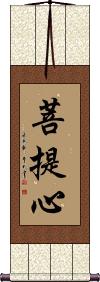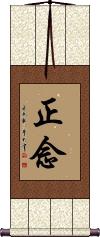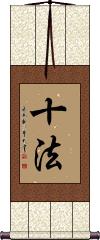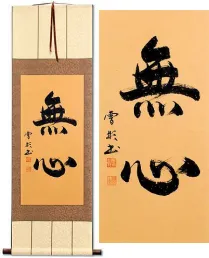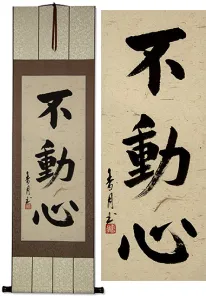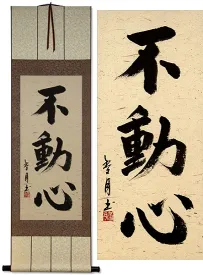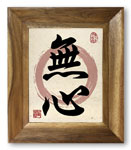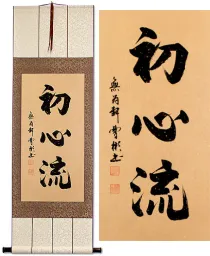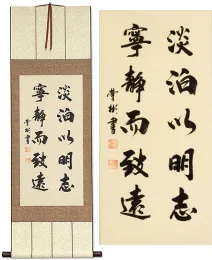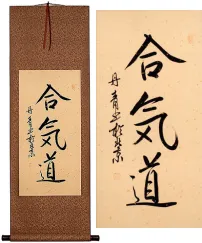Many custom options...
And formats...

Bodhi Mind in Chinese / Japanese...
Buy a Bodhi Mind calligraphy wall scroll here!
Personalize your custom “Bodhi Mind” project by clicking the button next to your favorite “Bodhi Mind” title below...
The Bodhi Mind
菩提心 means Bodhi-mind or Bodhi-heart.
This title represents the will to realize supreme enlightenment. The awakening of the Bodhi-mind is of utmost importance in Buddhist training.
Other definitions include the mind for or of bodhi, the awakened, enlightened mind, or having Buddha-nature.
7. Right Mindfulness / Right Memory / Perfect Mindfulness
Samyak Smriti / Samyak Smrti / Samma Sati
正念 is one of the Noble Eightfold Paths of Buddhism. Right Mindfulness, along with Right Effort and Right Concentration, constitute the path to Concentration or Perfect Thought.
Right Mindfulness is about remaining focused on one's body, feelings, mind, and mental qualities. It's also about being ardent, aware, and mindful, and supposes that you've already put aside worldly desire and aversion.
Monk Bhikkhu Bodhi described this as “The mind is deliberately kept at the level of bare attention, a detached observation of what is happening within us and around us in the present moment.” When practicing right mindfulness, the mind is trained to remain in the present, open, quiet, and alert, contemplating the present event.
Another definition: Ongoing mindfulness of body, feelings, thinking, and objects of thought.
This term is exclusively used by devout Buddhists. It is not a common term, and is remains an unknown concept to most Japanese and Chinese people.
See Also: Buddhism | Enlightenment | Noble Eightfold Path
Ten perfect Mahayana rules
十法 is the title of the ten perfect or perfecting Mahāyāna rules.
The order of rules is as follows:
1. right belief.
2. right conduct.
3. right spirit.
4. the joy of the bodhi mind.
5. joy in the dharma.
6. joy in meditation.
7. pursuing the correct dharma.
8. obedience to, or accordance with dharma.
9. departing from pride, desire, etc.
10. comprehending the inner teaching of Buddha and taking no pleasure in attaining such knowledge or noting the ignorance of others.
This title is only used in the context of Buddhism. Japanese and Chinese people who are not familiar with Buddhism will not recognize this title.
This in-stock artwork might be what you are looking for, and ships right away...
Gallery Price: $200.00
Your Price: $118.88
Gallery Price: $200.00
Your Price: $118.88
Gallery Price: $202.00
Your Price: $111.88
Gallery Price: $106.00
Your Price: $58.88
Gallery Price: $202.00
Your Price: $111.88
Gallery Price: $79.00
Your Price: $43.88
Gallery Price: $79.00
Your Price: $43.88
Gallery Price: $198.00
Your Price: $109.88
Not the results for bodhi mind that you were looking for?
Below are some entries from our dictionary that may match your bodhi mind search...
| Characters If shown, 2nd row is Simp. Chinese |
Pronunciation Romanization |
Simple Dictionary Definition |
十法 see styles |
shí fǎ shi2 fa3 shih fa jippō |
More info & calligraphy: Ten perfect Mahayana rules |
菩提 see styles |
pú tí pu2 ti2 p`u t`i pu ti bodai ぼだい |
More info & calligraphy: Bodhi - Awakening Enlightenment(1) {Buddh} bodhi; enlightenment; (2) {Buddh} happiness in the next world; (place-name, surname) Bodai bodhi; from budh; knowledge, understanding; perfect wisdom; the illuminated or enlightened mind; anciently intp. by 道, later by 覺 to be aware, perceive; for saṃbodhi v. 三. |
菩提心 see styles |
pú tí xīn pu2 ti2 xin1 p`u t`i hsin pu ti hsin bodaishin ぼだいしん |
More info & calligraphy: The Bodhi MindThe mind for or of bodhi; the awakened, or enlightened mind; the mind that perceives the real behind the seeming, believes in moral consequences, and that all have the Buddha-nature, and aims at Buddhahood. |
九識 九识 see styles |
jiǔ shì jiu3 shi4 chiu shih kumi くみ |
(female given name) Kumi The kinds of cognition or consciousness (vijñāna); those of sight, hearing, smell, taste, touch, mind, mānas (or阿陁那識 ādāna), i.e. mental perception; 阿賴耶 ālāya, bodhi-consciousness, and 阿摩羅識 amala, purified or Buddha-consciousness. There is considerable difference as to the meaning of the last three. |
十問 十问 see styles |
shí wèn shi2 wen4 shih wen jūmon |
The ten questions to the Buddha, put into the mouth of Vajrapāṇi, which, with the answers given, form the basis of the 大日經. What is (or are) (1) the nature of the bodhi-mind? (2) its form or forms? (3) the mental stages requisite to attainment? (4) the difference between them? (5) the time required? (6) the character of the merits attained? (7) the activities or practices necessary? (8) the way of such practices? (9) the condition of the uncultivated and cultivated mind? (10) the difference between it and that of the follower of Yoga? |
十心 see styles |
shí xīn shi2 xin1 shih hsin jisshin |
The ten kinds of heart or mind; there are three groups. One is from the 止觀 4, minds ignorant and dark; affected by evil companions; not following the good; doing evil in thought, word, deed; spreading evil abroad; unceasingly wicked; secret sin; open crime; utterly shameless; denying cause and effect (retribution)―all such must remain in the flow 流 of reincarnation. The second group (from the same book) is the 逆流 the mind striving against the stream of perpetual reincarnation; it shows itself in devout faith, shame (for sin), fear (of wrong-doing), repentance and confession, reform, bodhi (i.e. the bodhisattva mind), doing good, maintaining the right law, thinking on all the Buddhas, meditation on the void (or, the unreality of sin). The third is the 眞言 group from the 大日經疏 3; the "seed" heart (i.e. the original good desire), the sprout (under Buddhist religious influence), the bud, leaf, flower, fruit, its serviceableness; the child-heart, the discriminating heart, the heart of settled judgment (or resolve). |
四法 see styles |
sì fǎ si4 fa3 ssu fa shihō |
There are several groups of four dharma: (1) 教法 the teaching of the Buddha); 理法 its principles, or meaning; 行法 its practice; 果法 its fruits or rewards. (2) Another group relates to bodhisattvas, their never losing the bodhi-mind, or the wisdom attained, or perseverance in progress, or the monastic forest life (āraṇyaka). (3) Also 信解行證 faith, discernment, performance, and assurance. (4) The Pure-land 'True' sect of Japan has a division: 教法, i. e. the 大無量壽經; 行法 the practice of the seventeenth of Amitābha's vows; 信法 faith in the eighteenth; and 證法 proof of the eleventh. The most important work of Shinran, the founder of the sect, is these four, i. e. 教行信證. (5) A 'Lotus ' division of 四法 is the answer to a question of Puxian (Samantabhadra) how the Lotus is to be possessed after the Buddha's demise, i. e. by thought (or protection) of the Buddhas; the cultivation of virtue; entry into correct dhyāna; and having a mind to save all creatures. |
四重 see styles |
sì zhòng si4 zhong4 ssu chung shijuu / shiju しじゅう |
(noun - becomes adjective with の) fourfold (四重禁) The four grave prohibitions, or sins, 四重罪 pārājikas: killing, stealing, carnality, lying. Also four of the esoteric sect, i. e. discarding the truth, discarding the bodhi-mind, being mean or selfish in regard to the supreme law, injuring the living. |
意力 see styles |
yì lì yi4 li4 i li iryoku いりょく |
will; will-power Mental power or intention; the purpose to attain bodhi or enlightenment. |
有性 see styles |
yǒu xìng you3 xing4 yu hsing yuusei / yuse ゆうせい |
(noun - becomes adjective with の) sexual To have the nature, 'i. e. to be a Buddhist, have the bodhi-mind, in contrast with the 無性 absence of this mind, i. e. the闡提 icchanti, or unconverted. |
本覺 本觉 see styles |
běn jué ben3 jue2 pen chüeh hongaku |
Original bodhi, i. e. 'enlightenment', awareness, knowledge, or wisdom, as contrasted with 始覺 initial knowledge, that is 'enlightenment a priori is contrasted with enlightenment a posteriori'. Suzuki, Awakening of Faith, P. 62. The reference is to universal mind 衆生之心體, which is conceived as pure and intelligent, with 始覺 as active intelligence. It is considered as the Buddha-dharmakāya, or as it might perhaps be termed, the fundamental mind. Nevertheless in action from the first it was influenced by its antithesis 無明 ignorance, the opposite of awareness, or true knowledge. See 起信論 and 仁王經,中. There are two kinds of 本覺, one which is unconditioned, and never sullied by ignorance and delusion, the other which is conditioned and subject to ignorance. In original enlightenment is implied potential enlightenment in each being. |
發心 发心 see styles |
fā xīn fa1 xin1 fa hsin hosshin |
Mental initiation or initiative, resolve, make up the mind to; to start out for bodhi, or perfect enlightenment; to show kindness of heart, give alms. |
七最勝 七最胜 see styles |
qī zuì shèng qi1 zui4 sheng4 ch`i tsui sheng chi tsui sheng shichi saishō |
The seven perfections, see唯識論, 9. 安住最勝 Perfect rest in the bodhisattva nature. 依止最勝 perfect reliance on, or holding fast to the great bodhi (awakened mind). 意果最勝 perfect resultant aim in-pity for all 事業最勝 Perfect in constant performance. 巧便最勝 Perfect in able device (for spiritual presentation). 廻向最勝 Perfect direction towards the highest bodhi. 滿淨最勝 Perfect purity and peace. |
九方便 see styles |
jiǔ fāng biàn jiu3 fang1 bian4 chiu fang pien ku hōben |
The nine suitable stages in religious service; cf. 大日經, 7; 作禮 salutation to the universal Triratna; 出罪 repentance and confession; 歸依 trust (in the Triratna); 施身 giving of self (to the Tathāgata); 發菩提心 vowing to devote the mind to bodhi; 隨喜 rejoicing (in all good); 勸請 beseeching (all Tathāgatas to rain down the saving law); 奉請法身 praying for the Buddha-nature in self and others for entry in the Pure Land; 迴向 demitting the good produced by the above eight methods, to others, universally, past, present, and future. This form of service is generally performed before engaging in esoteric observances. The verses in which these nine stages are presented are of a commendably devotional character. |
五菩提 see styles |
wǔ pú tí wu3 pu2 ti2 wu p`u t`i wu pu ti go bodai |
The five bodhi, or stages of enlightenment: (1) 發心菩提 resolve on supreme bodhi; (2) 伏心菩提 mind control, i. e. of the passions and observance of the pāramitās: (3) 明心菩提 mental enlightenment, study, and increase in knowledge and in the prajñāpāramitā: (4) 出到菩提 mental expansion, freedom from the limitations of reincarnation and attainment of complete knowledge; (5) 無上菩提 attainment of a passionless condition and of supreme perfect enlightenment;. |
月輪觀 月轮观 see styles |
yuè lún guān yue4 lun2 guan1 yüeh lun kuan gatsurinkan |
(or 月輪三昧) The moon contemplation ( or samādhi) in regard to its sixteen nights of waxing to the full, and the application of this contemplation to the development of bodhi within, especially of the sixteen kinds of bodhisattva mind of the lotus and of the human heart. |
胎藏界 see styles |
tāi zàng jiè tai1 zang4 jie4 t`ai tsang chieh tai tsang chieh taizō kai |
Garbhadhātu, or Garbhakośa-(dhātu), the womb treasury, the universal source from which all things are produced; the matrix; the embryo; likened to a womb in which all of a child is conceived— its body, mind, etc. It is container and content; it covers and nourishes; and is the source of all supply. It represents the 理性 fundamental nature, both material elements and pure bodhi, or wisdom in essence or purity; 理 being the garbhadhātu as fundamental wisdom, and 智 acquired wisdom or knowledge, the vajradhātu. It also represents the human heart in its innocence or pristine purity, which is considered as the source of all Buddha-pity and moral knowledge. And it indicates that from the central being in the maṇḍala, viz. the Sun as symbol of Vairocana, there issue all the other manifestations of wisdom and power, Buddhas, bodhisattvas, demons, etc. It is 本覺 original intellect, or the static intellectuality, in contrast with 始覺 intellection, the initial or dynamic intellectuality represented in the vajradhātu; hence it is the 因 cause and vajradhātu the 果 effect; though as both are a unity, the reverse may be the rule, the effect being also the cause; it is also likened to 利他 enriching others, as vajradhātu is to 自利 enriching self. Kōbō Daishi, founder of the Yoga or Shingon 眞言 School in Japan, adopted the representation of the ideas in maṇḍalas, or diagrams, as the best way of revealing the mystic doctrine to the ignorant. The garbhadhātu is the womb or treasury of all things, the universe; the 理 fundamental principle, the source; its symbols are a triangle on its base, and an open lotus as representing the sun and Vairocana. In Japan this maṇḍala is placed on the east, typifying the rising sun as source, or 理. The vajradhātu is placed west and represents 智 wisdom or knowledge as derived from 理 the underlying principle, but the two are essential one to the other, neither existing apart. The material and spiritual; wisdom-source and intelligence; essence and substance; and similar complementary ideas are thus portrayed; the garbhadhātu may be generally considered as the static and the vajradhātu as the dynamic categories, which are nevertheless a unity. The garbhadhātu is divided into 三部 three sections representing samādhi or quiescence, wisdom-store, and pity-store, or thought, knowledge, pity; one is called the Buddha-section, the others the Vajra and Lotus sections respectively; the three also typify vimokṣa, prajñā, and dharmakāya, or freedom, understanding, and spirituality. There are three heads of these sections, i. e. Vairocana, Vajrapāṇi, and Avalokiteśvara; each has a mother or source, e. g. Vairocana from Buddha's-eye; and each has a 明王 or emanation of protection against evil; also a śakti or female energy; a germ-letter, etc. The diagram of five Buddhas contains also four bodhisattvas, making nine in all, and there are altogether thirteen 大院 or great courts of various types of ideas, of varying numbers, generally spoken of as 414. Cf. 金剛界; 大日; 兩部. |
七菩提分 see styles |
qī pú tí fēn qi1 pu2 ti2 fen1 ch`i p`u t`i fen chi pu ti fen shichi bodai bun |
saptabodhyaṅga, also 七菩提寶, 七覺分, 七覺支, 七等覺支. Seven characteristics of bodhi; the sixth of the 七科七道品 in the seven categories of the bodhipakṣika dharma, v. 三十七菩提分 it represents seven grades in bodhi,viz,(1)擇法覺支(or 擇法菩提分 and so throughout), dharma-pravicaya-saṃbodhyaṇga, discrimination of the true and the fa1se : (2) 精進 vīrya-saṃbodhyaṇga, zeal, or undeflected progress;(3) 喜prīti-saṃbodhyaṇga., joy, delight; (4) 輕安 or 除 praśrabdhi-saṃbodhyaṇga. Riddance of all grossness or weight of body or mind, so that they may be light, free, and at ease; (5) 念 smrti-saṃbodhyaṇga, power of remembering the various states passed through in contemplation; (6) 定 samādhi-saṃbodhyaṇga.the power to keep the mind in a given realm undiverted; (7) 行捨 or 捨 upekṣā-saṃbodhyaṇga or upekṣaka, complete abandonment, auto-hypnosis, or indifference to all disturbances of the sub-conscious or ecstatic mind. |
五相成身 see styles |
wǔ xiàng chéng shēn wu3 xiang4 cheng2 shen1 wu hsiang ch`eng shen wu hsiang cheng shen gosō jōshin |
(五相成身觀) A contemplation of the five stages in Vairocana Buddhahood— entry into the bodhi-mind; maintenance of it; attainment of the diamond mind; realization of the diamond embodiment; and perfect attainment of Buddhahood. It refers also to the 五智 of the Vairocana group; also 五轉成身 (or 五法成身) . |
大光明王 see styles |
dà guāng míng wáng da4 guang1 ming2 wang2 ta kuang ming wang Dai kōmyō ō |
The Great-Light Ming-wang, Śākyamuni in a previous existence, when king of Jambudvīpa, at Benares. There his white elephant, stirred by the sight of a female elephant, ran away with him into the forest, where he rebuked his mahout, who replied, "I can only control the body not the mind, only a Buddha can control the mind." Thereupon the royal rider made his resolve to attain bodhi and become a Buddha. Later, he gave to all that asked, finally even his own head to a Brahman who demanded it, at the instigation of an enemy king. |
大菩提心 see styles |
dà pú tí xīn da4 pu2 ti2 xin1 ta p`u t`i hsin ta pu ti hsin dai bodai shin |
The great bodhi, i.e. Mahāyāna or Buddha-enlightenment, as contrasted with the inferior bodhi of the śrāvaka and pratyekabuddha. |
心無所住 心无所住 see styles |
xīn wú suǒ zhù xin1 wu2 suo3 zhu4 hsin wu so chu shin mu shojū |
The mind without resting-place, i. e. detached from time and space, e. g. the past being past may be considered as a 'non-past' or non-existent, so with present and future, thus realizing their unreality. The result is detachment, or the liberated mind, which is the Buddha-mind, the bodhi-mind, 無生心 the mind free from ideas of creation and extinction, of beginning and end, recognizing that all forms and natures are of the Void, or Absolute. |
淨菩提心 净菩提心 see styles |
jìng pú tí xīn jing4 pu2 ti2 xin1 ching p`u t`i hsin ching pu ti hsin jō bodai shin |
Pure bhūtatathatā bodhi mind, or mind of pure enlightenment, the first stage of the practitioner in the esoteric sect. |
金剛寶藏 金刚宝藏 see styles |
jīn gāng bǎo zàng jin1 gang1 bao3 zang4 chin kang pao tsang kongō hōzō |
The 'Diamond' treasury i.e. nirvana and the pure bodhi-mind, as the source of the mind of all sentient beings, v. Nirvana Sutra. |
受菩提心戒義 受菩提心戒义 see styles |
shòu pú tí xīn jiè yí shou4 pu2 ti2 xin1 jie4 yi2 shou p`u t`i hsin chieh i shou pu ti hsin chieh i Ju bodaishin kaigi |
Taking the Precepts of Bodhi-Mind |
廣釋菩提心論 广释菩提心论 see styles |
guǎng shì pú tí xīn lùn guang3 shi4 pu2 ti2 xin1 lun4 kuang shih p`u t`i hsin lun kuang shih pu ti hsin lun kōshaku bodaishinron |
Extensive Explanation of the Treatise on Bodhi-mind. |
發菩提心方便 发菩提心方便 see styles |
fā pú tí xīn fāng biàn fa1 pu2 ti2 xin1 fang1 bian4 fa p`u t`i hsin fang pien fa pu ti hsin fang pien hotsu bodaishin hōben |
vowing to devote the mind to bodhi |
The following table may be helpful for those studying Chinese or Japanese...
| Title | Characters | Romaji (Romanized Japanese) | Various forms of Romanized Chinese | |
| The Bodhi Mind | 菩提心 | bo dai shin bodaishin | pú tí xīn pu2 ti2 xin1 pu ti xin putixin | p`u t`i hsin putihsin pu ti hsin |
| 7. Right Mindfulness Right Memory Perfect Mindfulness | 正念 | sei nen / seinen | zhèng niàn zheng4 nian4 zheng nian zhengnian | cheng nien chengnien |
| Ten perfect Mahayana rules | 十法 | jippou / jipo | shí fǎ / shi2 fa3 / shi fa / shifa | shih fa / shihfa |
Successful Chinese Character and Japanese Kanji calligraphy searches within the last few hours...
